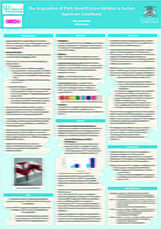By Ben Handysides //
 For many people, the phrase ‘autistic savant’ conjures up images from the iconic film ‘Rain Man’, of extraordinary talents such as calendar calculation, lightning arithmetic and the ability to draw complex scenes from memory. Although exceedingly rare in the general population, savant skills are much more common in Autism Spectrum Conditions (ASC). Despite this, relatively little is known as to why savant skills are more prevalent in ASC, or how they are acquired.
For many people, the phrase ‘autistic savant’ conjures up images from the iconic film ‘Rain Man’, of extraordinary talents such as calendar calculation, lightning arithmetic and the ability to draw complex scenes from memory. Although exceedingly rare in the general population, savant skills are much more common in Autism Spectrum Conditions (ASC). Despite this, relatively little is known as to why savant skills are more prevalent in ASC, or how they are acquired.
As far back as I can remember I have always been drawn to research, particularly in psychology, and being diagnosed with ASC myself has naturally lead me towards autism research, which I hope to pursue as an academic career.
I prefer not to think of ASC as a disorder, I feel this sounds far too chaotic. Instead I would regard ASC as a different cognitive style to that of neurotypicals. It is for this reason that savant skills in ASC appeals to me as a research topic, it places emphasis on areas of enhanced ability and is less reliant on presence of a deficit. I enjoy the positivity of it.
Naturally then, when I first heard about UROS, I jumped at the opportunity. I was part way through my undergraduate dissertation at the time, gathering data from a neurotypical sample, with the intention of continuing the study at master’s level using a clinical sample.
I decided to change this plan, bringing my masters project forward, when I found out about the UROS bursary. A decision I am glad I made, as it meant that I would be gaining experience working with people with ASC in a research capacity for the first time, with a sense of security that I could use the funding to overcome any obstacles.
Even with funding in place however, there was still one hurdle which I had not fully anticipated: I still had to find the participants to begin with.
My initial plan was to advertise the study through autism groups on social media, but I found that the majority of these groups were targeted at parents of children with ASC, rather than adults who could participate in my research, and so it seemed I would have to try a different approach.
I worked with several people to overcome this, but most notably my supervisor, Niko Kargas, who invited me to attend an autism group forum where I could tell potential participants about my study in person. I also worked alongside another researcher, sharing participants as our projects made use of some of the same data.
UROS has been an incredibly rewarding experience for me. I feel like this summer has passed in the blink of an eye, yet in such a short space of time I have gained new skills and developed existing ones. I have learned the importance of networking and self-reflection in psychological research, and most importantly I have had a taste of the world of academia, and realised the path I have chosen is the right one.
*To view Ben’s project poster, please click on the thumbnail below:

